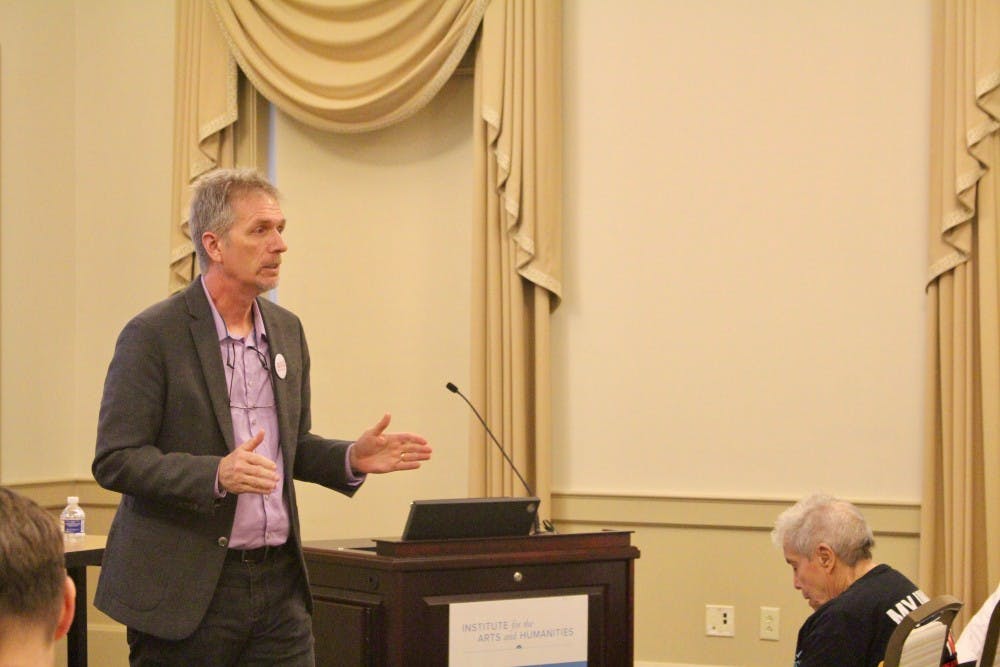In a quiet conference room in UNC’s Hyde Hall, professors from around the country gathered on Friday to discuss an issue university communities have argued, marched and protested over: academic freedom.
At the two-day symposium, organized by the North Carolina Conference of the American Association of University Professors, UNC sociology professorSherryl Kleinman and Appalachian State history professor Michael Behrent discussed encroachments on academic freedom they've witnessed throughout their own teaching careers in a joint presentation titled 'Threats to Academic Freedom from Inside and Out.'
Kleinman recounted an experience from Jay Smith, a UNC history professor, and a challenge to academic freedoms from within UNC.
Smith first encountered backlash over his course, Big-Time College Sports and the Rights of Athletes, 1956 to the Present, in the spring of 2016. The class discusses, in part, the NCAA academic scandal that embroiled UNC in the 2010's.
“The chair was worried that the department would suffer consequences if he kept the course on the fall 2016 schedule,” Kleinman said. “Deans, after all, control budgets, including faculty positions. In a long era of budget cuts, this was a serious threat.”
The course was approved for the 2016-2017 school year, but not the next. Eventually, after meetings and complaints, Kleinman said Smith's history course was approved by the associate dean, who was appointed around the time Smith filed a grievance with the national AAUP.
Though grateful his course was restored, Smith was unsatisfied with the experience as a whole. He contacted the Faculty Grievance Committee, which found the administration’s actions incongruent with the principles of academic freedom.
“The Chancellor and the Provost rejected the content of the Grievance Committee’s investigation,” Kleinman said. “In addition, the Provost and Chancellor’s replies claimed, alternately, the Deans have the right to interfere, and that the Deans did not interfere.”
The second half of the lecture, given by Behrent, focused on legislative threats to academic freedom. The main subject was legislation proposed by Arizona conservative think tank, the Goldwater Institute, some version of which has been adopted by multiple states, including North Carolina. It proposes that universities institute an official policy protecting free expression and nullifying speech codes.
Behrent said this essentially makes it legally impossible for speakers like Milo Yiannopoulos to be uninvited from campuses on the basis of extreme conservative views.
North Carolina passed this legislation on July 31, 2017 without the signature of Gov. Roy Cooper.
“Some of its key measures are to impose strict disciplinary measures on individuals accused of violating free speech rights of others, which refers to the idea the university ought to be neutral on public issues,” Behrent said.
This free speech policy, 1300.8 in the UNC Policy Manual, was adopted in December of 2017 and applies to all members of the UNC community. While it does not protect defamation or threats, the policy broadly covers the right to free speech — even “ideas and opinions (individuals) find unwelcome, disagreeable, or even deeply offensive.”
Behrent said that though the Board of Governors found no significant issue with the current status of free speech in their first report, the policy could have significant consequences down the road.
“We have a very Republican Board of Governors, pretty much appointed directly by a gerrymandered legislature, and they frequently get their ideas from these conservative think tanks,” Behrent said. “The James G. Martin Center for Academic Renewal is a Koch-funded center that focuses on education policy. They also came out with a report, and what they see as problems are worth paying attention to because I think that this is some stuff that could hit us in the upcoming year.”
The Center for Academic Renewal’s report discourages the bias-response teams such as that at UNC-Asheville, which helps students file complaints against bigotry, harassment or intimidation.
The report also emphasized what they considered low-institutional neutrality, citing Eastern Carolina University's summer reading assignment of the Pulitzer prize-winning "Evicted: Poverty and Profit in the American City" and first-year orientation skits at UNC in 2015 that encouraged culturally appropriate speech as examples of bias in higher education. Climate change and diversity stances were also criticized.
Behrent said that though the free speech policy seems relatively toothless, it’s something to keep in mind when thinking about academic freedoms.
Kate Saylor, a third-year Ph.D. student in Public Policy who attended the lecture, mentioned she’d hoped for a more two-sided debate.
“I was really struck in all of the talks that I’ve heard and in the discussion at how partisan this issue has become,” said Saylor. “It seems like the general consensus that academic freedom is the goal of the left, and academic suppression is the goal of the right. We also need to think about how to promote more diverse conversations on campuses, not have this just be the bastion of the liberal elite.”
Behrent ended the lecture with an open-ended question.
“We’re so concerned with the presence of intolerance in our society, how do we deal with that while articulating our support for free speech?”




